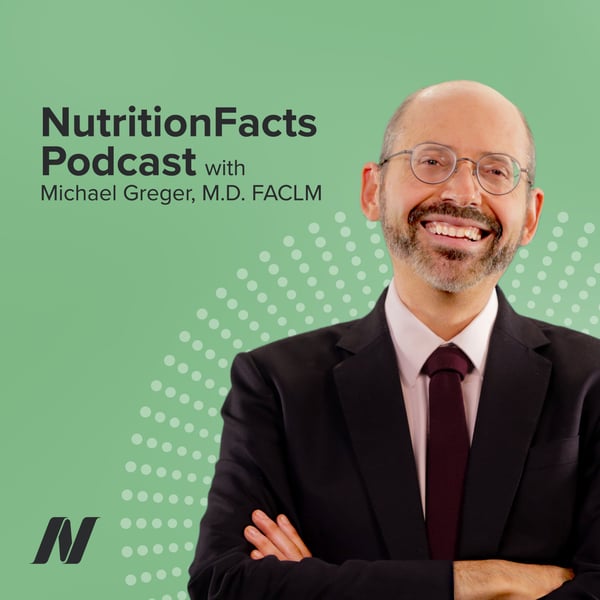Do You Need to Be Gluten-Free?
Nutrition Facts with Dr. Greger
[email protected]
4.8 • 3.6K Ratings
🗓️ 2 March 2023
⏱️ 18 minutes
🧾️ Download transcript
Summary
This episode features audio from The Potential Harm in Unnecessary Gluten-Free Diets, Is Gluten Sensitivity Real?, and Gluten-Free Diets: Separating the Wheat from the Chat. Visit the video pages for all sources and doctor's notes related to this podcast.
Transcript
Click on a timestamp to play from that location
| 0:00.0 | We have a lot of choices to make about our diet. Add to that doing the right thing when it comes to preventing or treating a chronic disease, fighting a virus or losing weight, and suddenly our nutrition choices can seem almost overwhelming. |
| 0:16.0 | Well, I'm here to help. Welcome to the Nutrition Facts podcast. I'm your host, Dr. Michael Greger. |
| 0:23.0 | More than 10,000 articles have been published on gluten in medical journals, intimidating even for me. |
| 0:30.0 | Today, we have a three-part series summarized in the best available science on gluten. |
| 0:35.0 | In our first story, we look at how we might prevent the inflammation that occurs from gluten-free diets. |
| 0:42.0 | Over the last decade or so, there's been a growing interest in the medical literature on plant-based eating, beyond just exclusionary terms like vegetarian or vegan. |
| 0:52.0 | Previous such studies were somewhat limited because they just split people up into either vegetarian or non-vegetarian, excluding some or all animal foods, but without taking into account the quality of plant foods. |
| 1:05.0 | vegans could be live off of that French fries, Oreos, and Coca-Cola. Enter changes in plant-based diet quality in total and cause specific mortality. |
| 1:16.0 | The first study to investigate the associations between changes in plant-based diet quality and subsequent risk of death. |
| 1:24.0 | If you look at overall plant-based diet scores, the more you increase your intake of any plant foods, and decrease your intake of any animal foods, the lower your risk of death appears to fall. |
| 1:34.0 | But that's because people were adding healthy plant foods like fruits and vegetables. If you just look at people who ate more processed sugary junk over time, their mortality risk goes up. |
| 1:45.0 | The clinical implications being the increasing intake of healthy plant foods and decreasing intake of not just animal foods, but also animal crackers could lower the future risk of premature death. |
| 1:56.0 | Whereas just reducing the intake of carbs in general, cutting down not just refined carbs and sugars, but healthy, high-carb foods like fruits and whole grains, is associated with increased overall mortality. |
| 2:07.0 | Which could correspond to years of your life being cut short, as well as the risk of dying specifically from heart disease, stroke, and cancer. |
| 2:16.0 | Why are whole plant foods so good for us? Much of the benefit may be mediated by a microbiome. There are all sorts of things threatening our good gut bugs like the over-prescription of antibiotics. |
| 2:29.0 | However, the only factor that has been empirically shown to be important is a diet low in microbiome accessible carbohydrates. In other words, the prebiotics like fiber and resistance starts only found one place in abundance, whole plant foods. |
| 2:46.0 | We went from high-mac diets to big-mac diets and maybe suffering the consequences. |
| 2:53.0 | Indic of dietary fiber, which is the main source of max in the diet, is negligibly low compared to how we evolved. Such a low-fiber diet provides insufficient food for our gut microbes, starving ourselves of all the wonderful things they produce for us. |
| 3:09.0 | A low-fiber diet is a key driver of microbiome depletion and this losses implicated in the rampant increase of chronic diseases that now plague the modern world. |
| 3:18.0 | We evolved getting perhaps 100 grams of fiber a day. Our gut bugs must have been in heaven! How do you even get close to that? A couple of fruit may only have about 3 grams. A couple of vegetables 5 grams. Why so little? |
| 3:34.0 | Because fruits and vegetables are like 80 to 90 percent water. One has to go to the drier plant foods to really scale it up like beans, at 15 grams or intact grains like barley over 30 grams per cup. |
| 3:48.0 | Many people are avoiding common grains these days like wheat barley and rye due to gluten, but there is a dark side of gluten-free diets. |
... |
Please login to see the full transcript.
Disclaimer: The podcast and artwork embedded on this page are from [email protected], and are the property of its owner and not affiliated with or endorsed by Tapesearch.
Generated transcripts are the property of [email protected] and are distributed freely under the Fair Use doctrine. Transcripts generated by Tapesearch are not guaranteed to be accurate.
Copyright © Tapesearch 2025.

